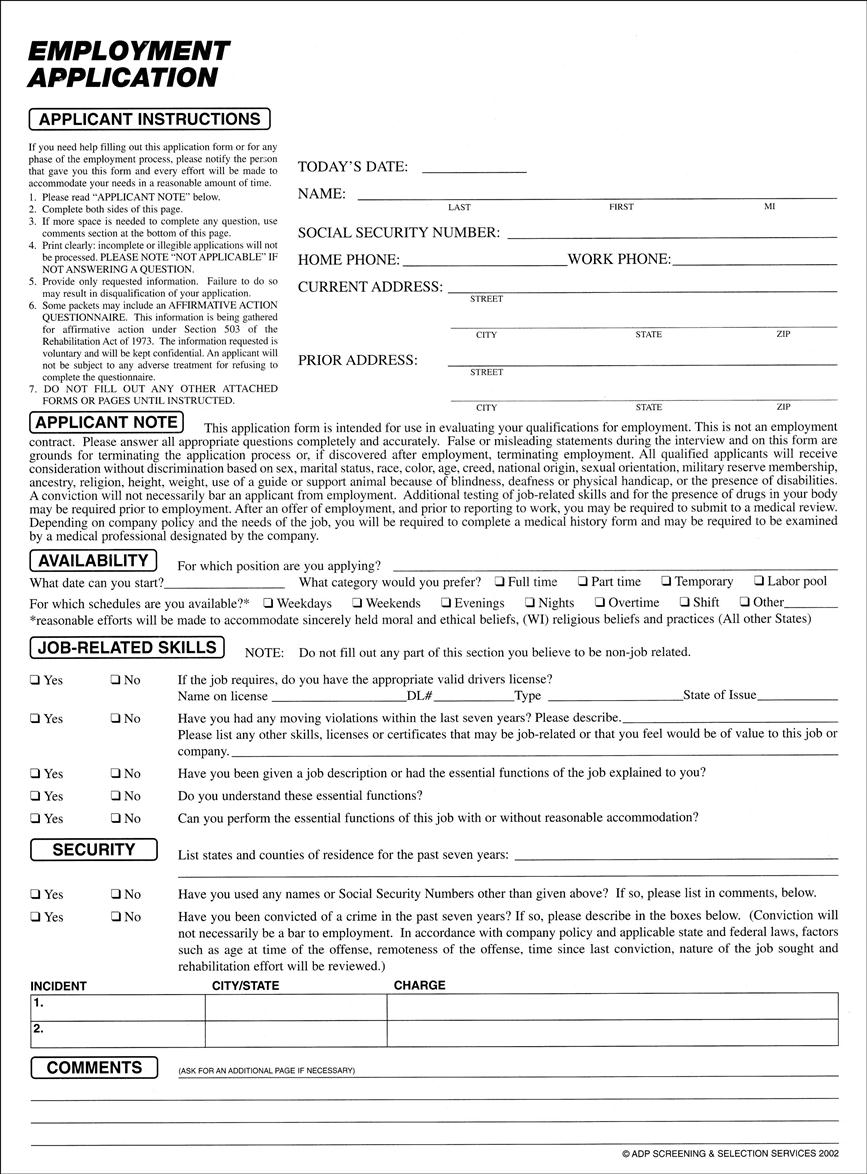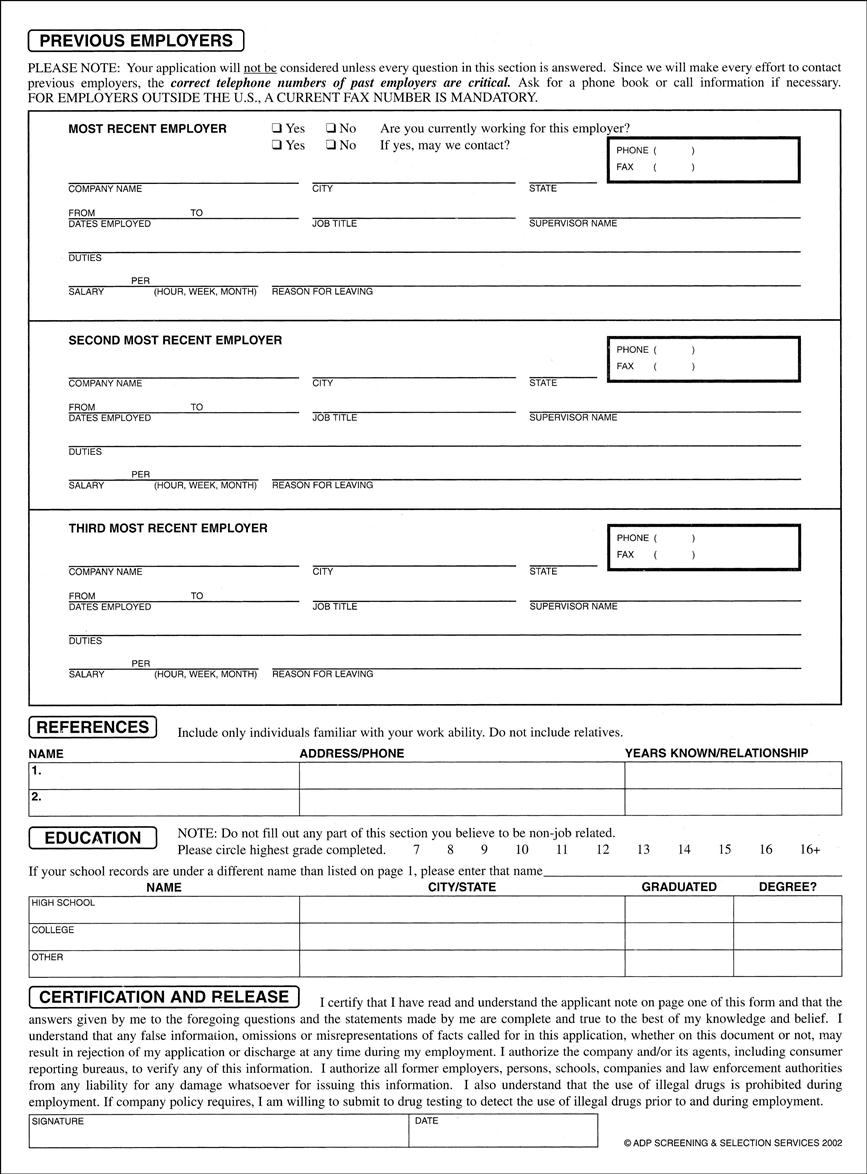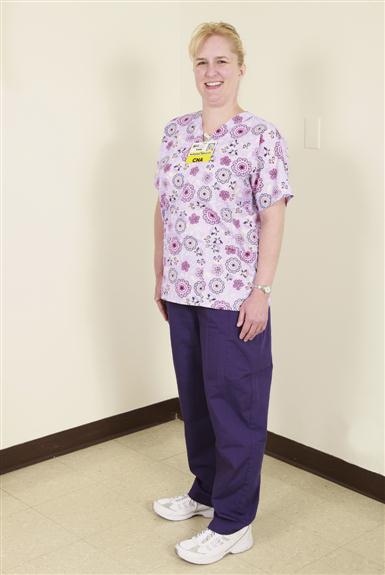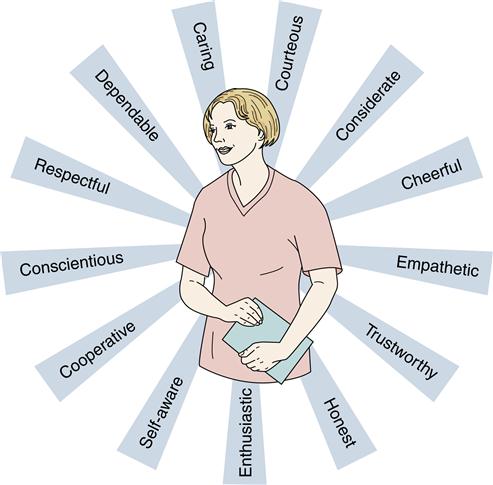Work ethics
Objectives
• Define the key terms and key abbreviations listed in this chapter.
• Identify good health and hygiene practices.
• Describe how to look professional.
• Describe the qualities and traits of a successful nursing assistant.
• Explain how to plan for childcare and transportation.
• Describe ethical behavior on the job.
• Explain how to manage stress.
• Explain the aspects of harassment.
• Explain how to resign from a job.
• Identify the common reasons for losing a job.
• Explain the reasons for drug testing.
Key terms
confidentiality Trusting others with personal and private information
courtesy A polite, considerate, or helpful comment or act
gossip To spread rumors or talk about the private matters of others
harassment To trouble, torment, offend, or worry a person by one’s behavior or comments
preceptor A staff member who guides another staff member; mentor
priority The most important thing at the time
professionalism Following laws, being ethical, having good work ethics, and having the skills to do your work
stress The response or change in the body caused by any emotional, physical, social, or economic factor
stressor The event or factor that causes stress
work ethics Behavior in the workplace
KEY ABBREVIATIONS
| NATCEP | Nursing assistant training and competency evaluation program |
| OBRA | Omnibus Budget Reconciliation Act of 1987 |
As a nursing assistant, you must act and function in a professional manner. Professionalism involves following laws, being ethical, having good work ethics, and having the skills to do your work. Laws and ethics are discussed in Chapter 4. Laws are rules of conduct made by government bodies. Ethics deals with right and wrong conduct. It involves choices and judgments about what to do or what not to do. An ethical person does the right thing. In the workplace, certain behaviors (conduct), choices, and judgments are expected. Work ethics deals with behavior in the workplace. Your conduct reflects your choices and judgments. Work ethics involves:
To get and keep a job, you must conduct yourself in the right way.
Health, hygiene, and appearance
Residents, families, and visitors expect the health team to look and act healthy. For example, a person is told to stop smoking, yet he or she sees health team members smoking. If you are not clean, people wonder if you give good care. You are part of the health team. Your health, appearance, and hygiene need careful attention.
Your health
You must give safe and effective care. To do so, you must be physically and mentally healthy. Otherwise you cannot function at your best.
• Diet. You need a balanced diet (Chapter 24). Start your day with a good breakfast. To maintain your weight, balance the calories you take in with your energy needs. To lose weight, take in fewer calories than your energy needs. Avoid foods high in fat, oil, and sugar. Also avoid salty foods and crash diets.
• Body mechanics. You will bend, carry heavy objects, and handle, move, and turn persons. These tasks place stress and strain on your body. You need to use your muscles correctly (Chapter 16).
Your hygiene
Personal hygiene needs careful attention. Bathe daily. Use a deodorant or antiperspirant to prevent body odors. Brush your teeth often—upon awakening, before and after meals, and at bedtime. Use a mouthwash to prevent breath odors. Shampoo often. Style hair in a simple, attractive way. Keep fingernails clean, short, and neatly shaped.
Menstrual hygiene is important. Change tampons or sanitary pads often, especially if flow is heavy. Wash your genital area with soap and water at least twice a day. Also practice good hand washing.
Foot care prevents odors and infection. Wash your feet daily. Dry thoroughly between the toes. Cut toenails straight across after bathing or soaking them.
Your appearance
Good health and hygiene practices help you look and feel well. Follow the practices in Box 5-1, p. 46. They help you look clean, neat, and professional (Fig. 5-1, p. 46).
Getting a job
There are easy ways to find out about jobs and places to work:
• Local state employment services
• Centers you would like to work at
• People you know—your instructor, family, and friends
• Your school’s or college’s job placement counselors
• Your clinical experience site
Your clinical experience site is an important source. The staff always looks at students as future employees. They look for good work ethics. They watch how students treat residents and co-workers. They look for the qualities and traits described in Box 5-2. If that center is not hiring, the staff may suggest other places to apply.
What employers look for
If you owned a business, who would you want to hire? Your answer helps you better understand the employer’s point of view. Employers want people who:
Good work ethics involves the qualities and traits described in Box 5-2. They are necessary for you to function well (Fig. 5-2).
Applicants who look good communicate many things to the employer. You have one chance to make a good first impression. A well-groomed person will likely get the job. A sloppy person with wrinkled or dirty clothes may not get the job, nor will someone with body or breath odors. See p. 48 for how to dress for an interview.
Being dependable is important. You must be at work on time and when scheduled. Undependable people cause everyone problems. Other staff take on extra work. Fewer people give care. Quality of care suffers. You want co-workers to work when scheduled. Otherwise, you have extra work. You have less time to spend with residents. Likewise, co-workers also expect you to work when scheduled.
Job skills and training
Employers need to know that you have the required job skills. ![]() To work in long-term care, you must complete a state-approved nursing assistant training and competency evaluation program (NATCEP). This is a requirement of the Omnibus Budget Reconciliation Act of 1987 (OBRA). The employer checks the nursing assistant registry and requests proof of training:
To work in long-term care, you must complete a state-approved nursing assistant training and competency evaluation program (NATCEP). This is a requirement of the Omnibus Budget Reconciliation Act of 1987 (OBRA). The employer checks the nursing assistant registry and requests proof of training:
Give the employer only a copy of your certificate, transcript, or grade report. Never give the original to the employer. Keep it for future use. The employer may want a transcript sent directly from the school or college.
Job applications
You get a job application from the personnel office or human resources office (Fig. 5-3, pp. 48-49). You can complete the application there. Or you can take it home and return it by mail or in person. You must be well-groomed and behave pleasantly when seeking or returning a job application. It may be your first chance to make a good impression.


To complete a job application, follow the guidelines in Box 5-3, p. 50. How you fill out the application may mean getting or not getting the job. Often the application is your first chance to impress the employer. A neat, readable, and complete application gives a good image. A sloppy or incomplete one does not.
Some centers provide job applications on-line. Follow the center’s instructions for completing and sending an on-line application.
The job interview
A job interview is the employer’s chance to get to know and evaluate you. You also find out more about the center.
The interview may be when you complete the job application. Some centers schedule interviews after reviewing applications. Write down the interviewer’s name and the interview date and time. If you need directions to the center, ask for them at this time.
Box 5-4, p. 50 lists common interview questions. Prepare your answers before the interview. Also prepare a list of your skills. Give the list to the interviewer.





